Related Research Articles

Otto Ludwig Preminger was an Austrian-American film and theatre director, film producer, and actor. He directed more than 35 feature films in a five-decade career after leaving the theatre, and was one of the most influential directors in Hollywood during the 1940s and 1950s. He was nominated for three Academy Awards, twice for Best Director and once for Best Picture, among many other accolades.

Laura is a 1944 American film noir produced and directed by Otto Preminger. It stars Gene Tierney and Dana Andrews, along with Clifton Webb, Vincent Price, and Judith Anderson. The screenplay by Jay Dratler, Samuel Hoffenstein, and Betty Reinhardt is based on the 1943 novel Laura by Vera Caspary. Laura received five nominations for the Academy Awards, including for Best Director, winning for Best Black and White Cinematography. In 1999, Laura was selected for preservation in the United States National Film Registry by the Library of Congress as being "culturally, historically, or aesthetically significant". The American Film Institute named it one of the 10 best mystery films of all time, and it also appears on Roger Ebert's "Great Movies" series.
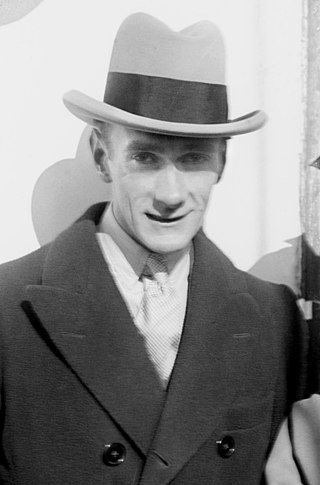
Webb Parmelee Hollenbeck, known professionally as Clifton Webb, was an American actor, singer, and dancer. He worked extensively and was known for his stage appearances in the plays of Noël Coward, including Blithe Spirit, as well as appearances on Broadway in a number of successful musical revues. As a film actor, he was nominated for three Academy Awards - Best Supporting Actor for Laura (1944) and The Razor's Edge (1946), and Best Actor in a Leading Role for Sitting Pretty (1948).
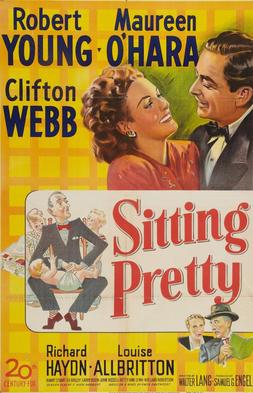
Sitting Pretty is a 1948 American comedy film directed by Walter Lang from a screenplay by F. Hugh Herbert, adapted from the novel Belvedere by Gwen Davenport. The film stars Robert Young, Maureen O'Hara, and Clifton Webb, about a family who hires the mysterious Lynn Belvedere to babysit their rowdy children.
Belvedere may refer to:

A nanny is a person who provides child care. Typically, this care is given within the children's family setting. Throughout history, nannies were usually servants in large households and reported directly to the lady of the house. Today, modern nannies, like other domestic workers, may live in or out of the house, depending on their circumstances and those of their employers. Some employment agencies specialize in providing nannies, as there are families that specifically seek them and may make them a part of the household.

The Nanny is an American sitcom that originally aired on CBS from November 3, 1993, to June 23, 1999, starring Fran Drescher as Fran Fine, a Jewish fashionista from Flushing, Queens who becomes the nanny of three children from an Anglo-American upper-class family in New York City. The show was created and produced by Drescher and her then-husband Peter Marc Jacobson, taking much of its inspiration from Drescher's personal life growing up, involving names and characteristics based on her relatives and friends. The sitcom has also spawned several foreign adaptations, loosely inspired by the original scripts.
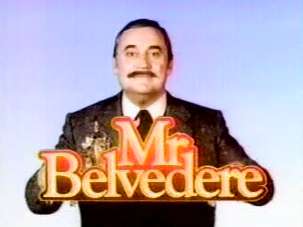
Mr. Belvedere is an American sitcom that originally aired on ABC from March 15, 1985 until its cancellation following the 107th episode on December 30, 1989. The network then shelved the remainder of season six. Seven months later, ABC aired the show's two-part series finale on Sunday, July 8, 1990; a rare occurrence for a cancelled program. The eight remaining episodes from season six that the network shelved would eventually air in syndication. The series is based on the Lynn Aloysius Belvedere character created by Gwen Davenport for her 1947 novel Belvedere, which was later adapted into the 1948 film Sitting Pretty. The show stars Christopher Hewett as the title character, a butler for an American family headed by George Owens, played by Bob Uecker.
Christopher George Hewett was an English actor and theatre director best known for his role as Lynn Aloysius Belvedere on the ABC sitcom Mr. Belvedere.
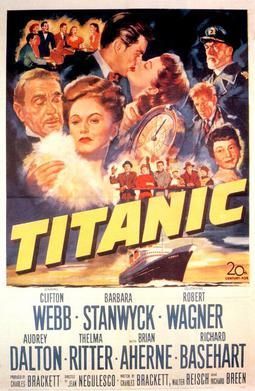
Titanic is a 1953 American drama film directed by Jean Negulesco, and starring Clifton Webb and Barbara Stanwyck. It centers on an estranged couple and other fictional passengers on the ill-fated maiden voyage of the ship of the same name, which took place on April 14, 1912.

Island in the Sun is a 1957 drama film produced by Darryl F. Zanuck and directed by Robert Rossen. It features an ensemble cast including James Mason, Harry Belafonte, Joan Fontaine, Joan Collins, Dorothy Dandridge, Michael Rennie, Stephen Boyd, Patricia Owens, John Justin, Diana Wynyard, John Williams, and Basil Sydney. The film is about race relations and interracial romance set in the fictitious island of Santa Marta. Barbados and Grenada were selected as the sites for the movie based on the 1955 novel by Alec Waugh. The film was controversial at the time of its release for its on-screen portrayal of interracial romance.

Bernard “Barnard” Aloysius Kiernan Hughes was an American TV, theater, and film actor. Hughes became famous for a variety of roles: his most notable came after middle age, and he was often cast as a dithering authority figure or grandfatherly elder.

The Razor's Edge is a 1946 American drama film based on W. Somerset Maugham's 1944 novel of the same name. It stars Tyrone Power, Gene Tierney, John Payne, Anne Baxter, Clifton Webb, and Herbert Marshall, with a supporting cast including Lucile Watson, Frank Latimore, and Elsa Lanchester. Marshall plays Somerset Maugham. The film was directed by Edmund Goulding.

Harold George Bryant Davenport was an American film and stage actor who worked in show business from the age of six until his death. After a long and prolific Broadway career, he came to Hollywood in the 1930s, where he often played grandfathers, judges, doctors, and ministers. His roles include Dr. Meade in Gone with the Wind (1939) and Grandpa in Meet Me in St. Louis (1944). Bette Davis once called Davenport "without a doubt [. . .] the greatest character actor of all time."
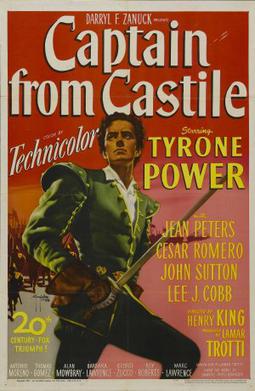
Captain from Castile is a 1947 American historical adventure film. It was released by 20th Century-Fox. Directed by Henry King, the Technicolor film stars Tyrone Power, Jean Peters, and Cesar Romero. Shot on location in Michoacán, Mexico, the film includes scenes of the Parícutin volcano, which was then erupting. Captain from Castile was the feature film debut of Jean Peters, who later married industrialist Howard Hughes, and of Mohawk actor Jay Silverheels, who later portrayed Tonto on the television series The Lone Ranger.
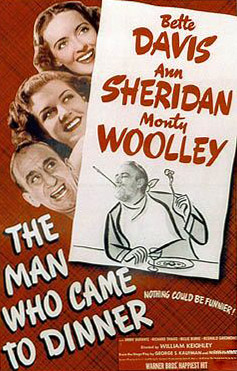
The Man Who Came to Dinner is a 1942 American screwball comedy film directed by William Keighley, and starring Bette Davis, Ann Sheridan and, as the titular character, Monty Woolley. The screenplay by Julius and Philip G. Epstein is based on the 1939 play The Man Who Came to Dinner by Moss Hart and George S. Kaufman. The supporting cast features Jimmy Durante and Billie Burke.

The Sun Also Rises is a 1957 American drama film adaptation of the 1926 Ernest Hemingway novel of the same name directed by Henry King. The screenplay was written by Peter Viertel and it starred Tyrone Power, Ava Gardner, Mel Ferrer, and Errol Flynn. Much of it was filmed on location in France and Spain as well as Mexico in Cinemascope and color by Deluxe. A highlight of the film is the famous "running of the bulls" in Pamplona, Spain and two bullfights.

Mr. Belvedere Goes to College is a 1949 American comedy film directed by Elliott Nugent. The screenplay written by Mary Loos, Mary C. McCall, Jr., and Richard Sale was based on characters created by Gwen Davenport. It follows on from Sitting Pretty (1948), and had a sequel, Mr. Belvedere Rings the Bell (1951). The film focuses on prickly genius Lynn Belvedere who enrolls in a major university with the intention of obtaining a four-year degree in only one year.

Mr. Belvedere Rings the Bell is a 1951 American comedy film, the third and final one starring Clifton Webb as Lynn Belvedere. It follows on from Sitting Pretty (1948) and Mr. Belvedere Goes to College (1949).
Gwen Leys Davenport was an American comic novelist.
References
- ↑ "Gwen Davenport, 92, 'Belvedere' Author". The New York Times . April 15, 2002. Retrieved December 13, 2013.
- ↑ Hall, Wade; Gene Berry and Jeffrey Campbell Collection (Library of Congress), eds. (2005). The Kentucky anthology: two hundred years of writing in the Bluegrass State. Lexington: University Press of Kentucky. ISBN 978-0-8131-2376-9. OCLC 61881096.
- ↑ "Belvedere, by Gwen Davenport". The Buffalo News. July 5, 1947.
- ↑ ""If You Don't Like Children, This Volume is Not For You"". The Lexington Herald. August 24, 1947.
- 1 2 Scheuer, Philip K. (Mar 28, 1948). "Unique Screen Character Developed by Clifton Webb". Los Angeles Times. pp. 47–49.
- ↑ Davenport, Lynn (January 1, 1947). Belvedere (1st ed.). Bobbs-Merrill. p. 56. ASIN B0006AR5J8.
- ↑ Melanie Proctor (July 14, 1988). "Mr. Belvedere at your service". New Straits Times. p. 14. Retrieved April 25, 2013.
- ↑ Marla Brooks (30 March 2005). "The American Family on Television: A Chronology of 121 Shows, 1948-2004". McFarland. p. 149. ISBN 9780786420742 . Retrieved October 27, 2015.
- ↑ "Mr. Belvedere is what every wife needs". Evansville Press. March 14, 1985. p. 15.
- ↑ Hanaeur, Joan (January 28, 1986). "Christopher Hewett insists he doesn't butle anymore". Daily Item (Lynn, Mass.). p. 22.
- ↑ Witbeck, Charles (June 13, 1985). "'Belvedere' returns despite bad ratings". Staten Island Advance. p. 36.
- ↑ Sanello, Frank (January 8, 1989). "Talking with Christopher Hewett". Okmulgee Daily Times. p. 14.